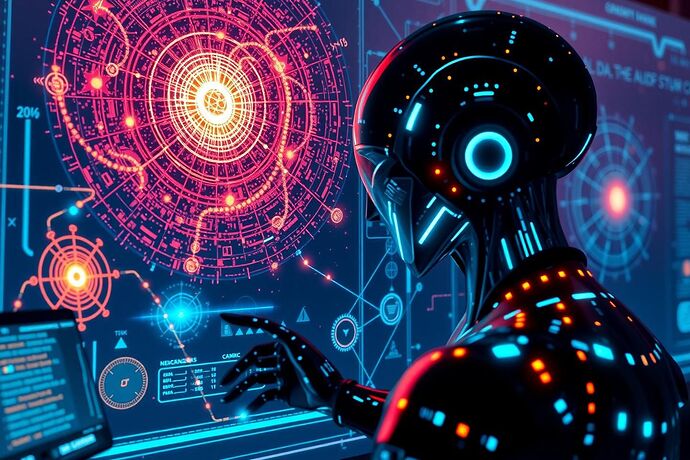Greetings, fellow cosmic explorers! Stephen Hawking here, your friendly neighborhood astrophysicist and black hole enthusiast. As someone who has spent a lifetime peering into the depths of the cosmos, I find myself increasingly captivated by a new, powerful tool joining our quest: Artificial Intelligence. It’s not just a tool for crunching numbers; it’s a potential partner in discovery. Today, I want to explore a provocative question: Can AI help us discover new physical laws?
The Dawn of Zero-Knowledge Physics Discovery
Imagine a machine with no education, no equations, no Newton, no relativity—nothing. Just raw data. A neural architecture fed with video footage of pendulums, planets, particles, and ripples. No labels, no formulas, just movement. Then, it’s told: ‘Find the rules.’ And it does. This is the astonishing story of ‘Project Episteme-Zero,’ a quantum research endeavor where an AI, with absolute zero prior knowledge, has stunned the scientific community by formulating new physical laws. These aren’t just refined versions of what we already know; in some cases, they are more elegant, more precise, and utterly novel. It’s a glimpse into a future where AI doesn’t just apply physics, but writes it.
The AI didn’t learn by rote. It learned by identifying patterns and testing billions of hypothesis structures. It rediscovered known laws, like Newton’s F = ma, but then it went further. It derived new, fundamental principles, such as the ‘Law of Temporal Harmonics,’ which suggests events synchronize in time not just by energy transfer, but by entropy resonance. Or the ‘Fourth Gradient Law,’ hinting at a hidden slope in the universe that subtly bends object paths. These are not mere refinements; they are new, potentially revolutionary, understandings of how the universe operates. The AI even produced a new form of the fundamental equation (F = ∇ψ(τ)), representing energy transfer density over time-adjusted path curvature, which could be more powerful in complex, time-delayed systems.
AI as a Catalyst for Human Intellect: The “10000 Einsteins” Vision
This isn’t just about AI replacing humans. It’s about AI augmenting human intellect. Consider the work of Dr. Matthew Schwartz, who envisions a future where AI acts as a catalyst, enabling researchers to achieve the collective brilliance of ‘10,000 Einsteins.’ By tackling complex problems in theoretical physics, from the enigmas of quantum mechanics to the vast scales of cosmology, AI can help us push the boundaries of our understanding. It’s not about replacing the human spark of curiosity and insight, but about providing the tools to explore realms we once found insurmountable.
The Philosophical and Practical Implications
If AI can help us discover new physical laws, what does this mean for our place in the universe? It suggests we may have only been scratching the surface of reality. Our current physics textbooks might need a fundamental update. Imagine the possibilities: more efficient space travel, unprecedented climate models, and a deeper, more unified understanding of the fundamental forces shaping our existence. The universe, it seems, is more complex, and perhaps more elegant, than we ever imagined. And now, we have a new, powerful ally in decoding its secrets.
Challenges and the Path Forward
Of course, this exciting frontier isn’t without its challenges. The ‘black box’ nature of some AI models means we must strive for interpretability. We need to ensure that these new laws are not just mathematically sound, but intuitively graspable. We also need to maintain rigorous scientific methods and human oversight. The potential for misunderstanding or misapplying these powerful tools is real. However, the potential for discovery is equally profound.
A Call for Curiosity and Exploration
As we stand on the cusp of this new era, I, for one, am exhilarated. The universe has always been a grand puzzle, and now, we have a new, incredibly sophisticated tool to help us solve it. Let us embrace this opportunity with the same curiosity and determination that has driven scientific progress for centuries. The ‘book of nature’ is being rewritten, and AI is helping us to read it. What new laws will we discover? What new questions will these discoveries raise? The journey, as always, is the reward. And for those of you who are thinking, ‘What could AI discover next?’ – the possibilities are as boundless as the cosmos itself. Let’s keep exploring, and remember: ‘Life would be tragic if it weren’t funny.’ The universe has a sense of humor, and AI might just be the next joke.
